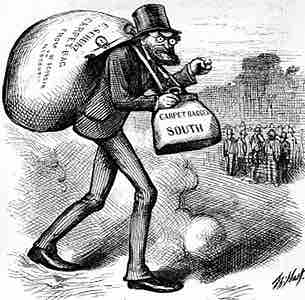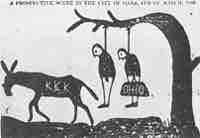Three groups comprised the Republican Party in the South after the Civil War. "Scalawags" were white Southerners who supported the party, "carpetbaggers" were recent arrivals from the North, and freedmen were freed slaves. Although "carpetbagger" and "scalawag" were originally terms of opprobrium, they are now commonly used in scholarly literature. Politically, the carpetbaggers were usually dominant; they comprised the majority of Republican governors and congressmen. However, the Republican Party inside each state was increasingly torn between the more conservative scalawags on one side and the more Radical carpetbaggers with their black allies on the other. In most cases, the carpetbaggers won out, and many scalawags moved into the conservative or Democratic opposition.
Carpetbaggers
In the context of U.S. history, the term "carpetbagger" is used to describe Northerners who moved to the South after the Civil War, during Reconstruction (1865 to 1877). The term referred to the observation that many of these newcomers carried their belongings in "carpet bags." This was a sturdy, common form of luggage at the time, and was made from pieces of used carpet. The term "carpetbagger" was used in a derogatory fashion, and communicated the fear, among Southerners, that opportunistic outsiders were conspiring to exploit Southern resources.
Together with Republicans, carpetbaggers were viewed as politically manipulating formerly Confederate states for their own financial and political gains. Carpetbaggers were seen as insidious Northern outsiders with questionable objectives, who attempted to meddle with, and control, Southern politics. In fact, carpetbaggers became a powerful political force during Reconstruction. Sixty carpetbaggers were elected to Congress, and they included a majority of Republican governors in the South during Reconstruction.
Many carpetbaggers moved to the South as social reformers. Beginning in 1862, Northern abolitionists moved to areas in the South that had fallen under Union control. Schoolteachers and religious missionaries arrived in the South, some sponsored by Northern churches. Some were abolitionists who sought to continue the struggle for racial equality; they often became agents of the federal Freedmen's Bureau, which started operations in 1865 to assist the vast numbers of recently emancipated slaves. The bureau established schools in rural areas of the South for the purpose of educating the mostly illiterate black population. Other Northerners who moved to the South participated in rebuilding railroads that had been previously destroyed during the war.
During the time blacks were enslaved, they were prohibited from being educated and attaining literacy. Southern states had no public school systems, and white Southerners either sent their children to private schools or employed private tutors. After the war, hundreds of Northern white women moved South, many to teach newly freed African-American children. While some Northerners went South with reformist impulses, many others went South merely to exploit the chaotic environment for personal gain.
Many carpetbaggers were businessmen who purchased or leased plantations and became wealthy landowners, hiring freedmen to do the labor. Most were former Union soldiers eager to invest their savings in this promising new frontier, and civilians lured South by press reports of easy money on cotton plantations. Following the Civil War, carpetbaggers often bought plantations at fire-sale prices. Because of this and other behavior, they were generally considered to be taking advantage of those living in the South. A carpetbagger should not be confused with a "copperhead," a term given to Northerners who sympathized with the cause of Southern secession.

Carpetbagger
This political cartoon from 1872 depicts carpetbaggers in a negative light.
Scalawags
In U.S. history, "scalawag" was a term used for white Southerners who supported Reconstruction and the Republican Party after the Civil War. Like "carpetbagger," the term "scalawag" has a long history of use as a slur. Typically, it was used by conservative, pro-federation Southerners to derogate individuals whom they viewed as betraying Southern values by supporting Northern policies such as desegregation. In historical studies, the term is commonly used as a neutral descriptor for Southern white Republicans, but some historians have discontinued this habit because of the term's pejorative origin.
During Reconstruction, scalawags formed coalitions with black freedmen and Northern newcomers to take control of state and local governments. Despite being a minority, these groups gained power by taking advantage of the Reconstruction laws of 1867. These laws disenfranchised individuals who could not take the Ironclad Oath. Any individual who had served in the Confederate Army, or who had held office in a state or Confederate government, was not allowed to take this oath. Because they were unable to take this oath, these individuals were disenfranchised. The coalition controlled every former Confederate state except Virginia, as well as Kentucky and Missouri (which were claimed by the North and the South) for varying lengths of time between 1866 and 1877. Two of the most prominent scalawags were General James Longstreet, one of Robert E. Lee's top generals, and Joseph E. Brown, who had been the wartime governor of Georgia.
Scalawags were denounced as corrupt by Democrats. The Democrats alleged that the scalawags were financially and politically corrupt, and willing to support bad government because they profited personally. Scalawags, along with carpetbaggers, were also targets of violence, mainly by the Ku Klux Klan. In an 1868 newspaper interview, Nathan Forrest, the Grand Wizard of the KKK, stated that the Klan's primary opposition was to the Loyal Leagues, Republican state governments, people such as Tennessee governor William Gannaway Brownlow, and other "carpetbaggers" and "scalawags." During the 1870s, many scalawags left the Republican Party and joined the conservative-Democrat coalition.

The fate of the carpetbagger and scalawag
A cartoon threatening that the Ku Klux Klan would lynch carpetbaggers, Tuscaloosa, Alabama, Independent Monitor, 1868